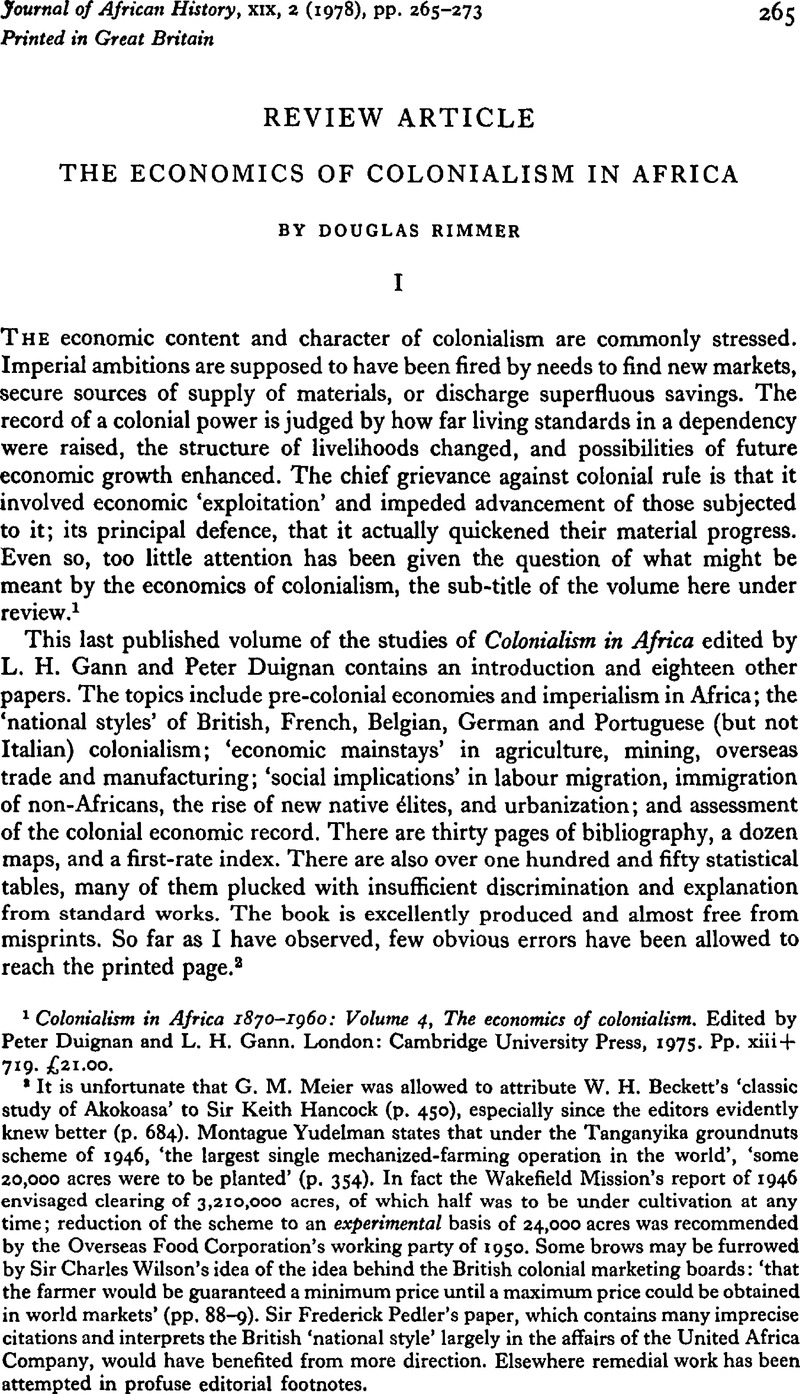Article contents
The Economics of Colonialism in Africa
Published online by Cambridge University Press: 22 January 2009
Abstract

- Type
- Review Article
- Information
- Copyright
- Copyright © Cambridge University Press 1978
References
1 Colonialism in Africa 1870–1960: Volume 4, The economics of colonialism. Edited by Duignan, Peter and Gann, L. H.. London: Cambridge University Press, 1975. Pp. xiii + 719. £21.00.Google Scholar
2 It is unfortunate that G. M. Meier was allowed to attribute W. H. Beckett's ‘classic study of Akokoasa’ to Sir Keith Hancock (p. 450), especially since the editors evidently knew better (p. 684). Montague Yudelman states that under the Tanganyika groundnuts scheme of 1946, ‘the largest single mechanized-farming operation in the world’, ‘some 20,000 acres were to be planted’ (p. 354). In fact the Wakefield Mission's report of 1946 envisaged clearing of 3,210,000 acres, of which half was to be under cultivation at any time; reduction of the scheme to an experimental basis of 24,000 acres was recommended by the Overseas Food Corporation's working party of 1950. Some brows may be furrowed by Sir Charles Wilson's idea of the idea behind the British colonial marketing boards: ‘that the farmer would be guaranteed a minimum price until a maximum price could be obtained in world markets’ (pp. 88–9). Sir Frederick Pedler's paper, which contains many imprecise citations and interprets the British ‘national style’ largely in the affairs of the United Africa Company, would have benefited from more direction. Elsewhere remedial work has been attempted in profuse editorial footnotes.
3 ‘State’ and ‘monopoly capitalism’ are joined together here as adjectives describing a noun that has been omitted. A tendency to neglect nouns in favour of adjectives is characteristic of the ‘radical’ literature.
4 For instance, in a short study of French aid produced for the Overseas Development Institute in 196s by a young English scholar, Teresa Hayter, the suggestion was made (pp. 69–71) that the CFA franc was left overvalued in relation to the French franc in 1945 and 1948 to serve the interest of French residents in Africa converting profits or savings from CFA to metropolitan francs at the official rate. A decade later, this suggestion appears in the paper by Professors Thompson and Adloff (p. 137). The only evidence cited for it is Teresa Hayter's study.
5 The balance sheets of imperialism (New York 1936)Google Scholar. Clark's accounting pointed emphatically to the conclusion that imperialism did not pay.
6 In 1901 the German administration of Cameroon comprised 77 whites, from governor to gardeners; that of Togo, 23. At the outbreak of the First World War the military establishment of German Africa was fewer than 8,000 men, most of them African (Gann, pp. 18, 229–30, 235).
7 Having been curiously foreshadowed, as Kilby describes (pp. 482–4), by nationalizations of some industries in southern Rhodesia in 1942–4, measures humorously described by Sir Godfrey Huggins's government as intended to ‘prevent monopolies’ and secure ‘the lowest prices’.
8 Floyd and Lillian Dotson recognize that backward African people, the Afrikaners of South Africa, as pioneers of this process, securing transfers from mining earnings to subsidize their agriculture and an officially enforced colour bar in industry. ‘In this they have reacted, as in so many other respects, in ways highly typical of modem Africa, black or white …’ (p. 575).
9 Thus the Scots like the Nigerians were obliged to maintain 100 per cent sterling cover of their currency circulation although much of this money was permanently localized.
10 The struggle still continues, for emancipation is now sought from the economics of ‘neo-colonialism’. A suggested objective is ‘maximum autarchic separation … from the world capitalist economy’. Freed from the process of underdevelopment, African states would then find in ‘socialism’ the only path to ‘full development’ (see Martin Legassick's review article on some of the recent radical literature, ‘Perspectives on African “underdevelopment”’, J. of Afr. Hist., xvii, (1976), 435–40)Google Scholar. The goal seems to be creation of economies in which consumers derive much of their psychic income from the knowledge that they are not being exploited as producers, or at any rate not by non-Africans.
- 4
- Cited by


